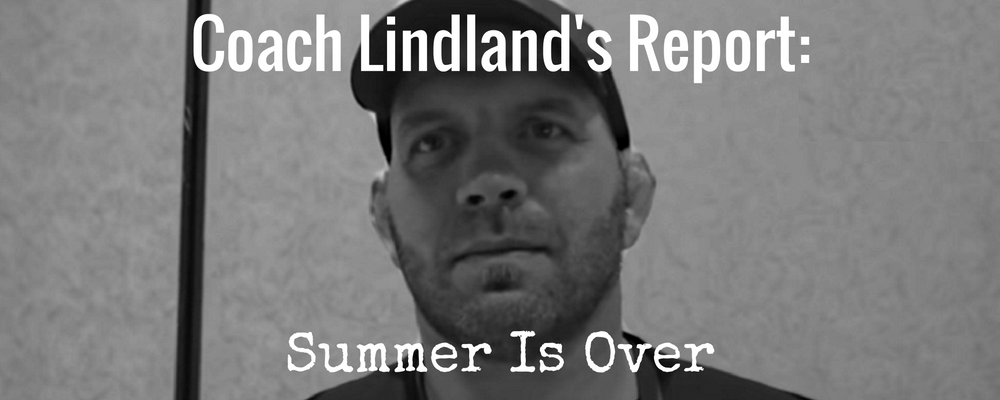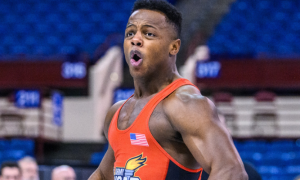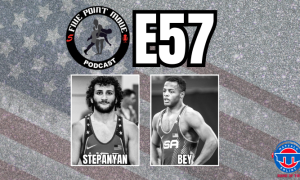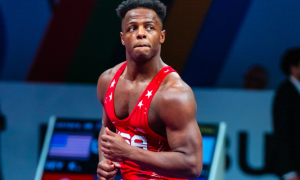Five Point Move is proud to host US Greco Roman National Team Head Coach Matt Lindland every week for “Coach Lindland’s Report.” For fans and wrestlers looking for insights regarding the US Greco National Team, we ask Coach Lindland some questions to get his take on training and upcoming competitions. If you have any questions you’d like us to ask going forward let us know via Facebook, Twitter, or through our Contact page.
This week, we talk to Coach Lindland following the 2016 Cadet Greco Roman World Championships in Tbilisi, Georgia. All in all, it wasn’t the best of times for the Team USA Cadets. Jack Davis (58 kg) was the only competitor who got as far as the medal rounds, but he was unable to snag a spot on the podium. Even still, athletes like Davis, Andrew Chambal (42 kg), Malik Johnson (50 kg) and Clay Lautt (76 kg) showed plenty of fight, just not the same level of experience as their international opposition, so we ask Coach Lindland about that. We also get his take on the new job opening at Northern Michigan, the cancellation of the University Worlds, and whether or not he thinks it is fair for Olympians to be disqualified from competing at the non-Olympic weight Worlds.
5PM: What was your overall assessment of the Cadets performance at the Worlds last week?
Coach Matt Lindland: It was disappointing because we have so many talented young athletes, it’s just unfortunate that they don’t get enough experience in Greco Roman. You know, it’s the same narrative we’ve talked about over and over. These guys are bouncing between spending nine, ten months a year wrestling in a folkstyle system that nobody else in the world competes in. They are bouncing between folkstyle, freestyle, and Greco. They aren’t getting the competition they need at the international level. And the international level for Cadets is a lot tougher than the domestic level here. It’s a different style of wrestling. If I watch Fargo and then watch the World Championships, I would think I’m watching two different styles of wrestling. In Fargo, it looks like freestyle. A lot of head snaps, straight-arm push-outs, and bending at the waist. It’s not a pure Greco style and we don’t have enough coaches here in our country who are teaching a pure Greco style.
We are working on a plan right now to get some of our top coaches in each region putting camps together throughout the year so that athletes have the opportunity to train with some elite coaches like JD Robbins, Mark Halvorson, Craig LaMont, Lucas Steldt up in Wisconsin. Athletes can bring their own coaches, as well. That way, the athlete’s home coach can see how practices are run and the techniques we’re talking about. We have these guys, we just don’t have very many of them. What we have are a lot of coaches in this country who really understand folkstyle and they are very comfortable with that and they don’t want to get out of their comfort zones to pick up new skills, new techniques, strategies, and tactics. Because they’re comfortable, they like what they are doing and that is where they are getting paid to coach, their schools or their clubs are paying them so they can get these athletes to colleges.
You even talk to someone like Brandon Paulson, who is an elite Greco Roman coach in our country and he’s focusing a lot of his efforts on his folkstyle guys, getting his guys in position where they can earn a scholarship to a Division I school. We, as a Greco program, end up losing these athletes because once they go into a college program, that is purely their focus and they aren’t wrestling any Greco at that age. We need to capture these Cadets and get them into an international system if we want to be successful at an international level at the Cadet age group.
5PM: It would be great for the sport if kids at the age-group level who want the option to at least continue training in Greco or even compete to be able to do so. Even if that would mean breaking up the folkstyle season a little bit.
ML: Well, that’s our hope. We’re trying to put a system in place with the existing coaches we have to where these guys are training Greco during the folkstyle season. That is definitely part of the plan. We can’t just abandon Greco Roman for nine, ten months out of the year and then April comes around and we’re going to train all the way through the end of July, Fargo, or whenever. Or even the Trials. If some of these guys don’t make a team, they are probably done training Greco for the rest of the summer. Even a lot of our Cadets were wrestling in postseason folkstyle tournaments and freestyle tournaments throughout the summer. They weren’t focused on training and preparing to win Greco Roman world titles as their sole purpose. I think we can change that. It’s going to take some time. But once an athlete makes a team, we need to get some level of commitment from them that they will be focused just on winning their World medals. And we’re definitely capable because we have really, really good young athletes in this country.
5PM: That was part of my thing this week, is that these kids were as game as could be. Maybe there wasn’t the same level of refinement or nuance technically as the international opponents, but you could see that they all fought like junkyard dogs. No one got dominated, they were just missing something.
ML: Yeah, I think that’s definitely a strength of the Americans, the guys go hard and they fight hard. But sometimes, we’re getting guys who are maybe not the best Greco Roman wrestler making the team, but because they are tough, athletic, physically-tough kids and they are going out and wearing better guys out domestically, thus making the team. We may have guys who we left at home who are better Greco Roman wrestlers, but you’re absolutely right: The guys we sent were physically capable, tough kids who are talented and they are going to scrap. But they don’t have the refinement, they don’t have the subtleties of the sport, the strategies and tactics. There are definitely different strategies and tactics.
Even when I’m training with these guys, they will hit an attack and get near the edge and stop wrestling instead of driving a guy through and just taking the one (point). Because they are focused on getting to the body and scoring a takedown or throwing a guy for four or five points. But they aren’t taking those easy one-point moves, they aren’t pummeling for passivity with an intent of, You know what? I might not get a takedown but I’m going to get the passivity. My butt is going to stay in the center, I’m not going to back up, I’m going to control the tie-ups to a good underhook and control the position. Even when we do get in some of those positions, you can still see the hips go back, the head goes down, and that is all it takes when you get in some of those positions with the best guys from each country. You just have to make one subtle mistake, your hips go back an inch and you’re giving that guy enough space to get his hips through there and throw you. But that comes from us just sprawling all the time. We’re wrestling folkstyle, we’re wrestling freestyle, and we’re hitting sprawls. It’s not really something you do in Greco. When a guy attacks the body, you meet that pressure. You go into his pressure.
So yeah, it’s fundamentals and basics. We’re not ingrained in the fundamentals and basics at an early enough stage. We have the Seven Basic Skills, but I think we focus on the first five a lot and we neglect the back-step and back-arch. And there is more than one way to penetrate through your opponent. You can step to him and cover some ground, but you’re also moving him away. And whatever distance you may move him away, you have to cover that distance. But if you step your leg in the middle and pull your opponent on you, that’s still a penetrating move. You might even be getting in deeper. I remember when we were trying to get Kyle Dake to wrestle a little Greco Roman, he just had this profound epiphany where he said, “Coach, so what you’re saying is that you want my hips IN when I attack?” Yes, that’s it, Kyle, it’s that simple. “Oh, I’m so used to shooting and then bringing my hips in.” And I think that it is really profound in the sense that is what our athletes are used to doing, it’s what they are comfortable with — attacking and then bringing their hips in. But that space is what is giving their opponents the opportunity to score. You have to attack with your hips in. You can’t shoot and then try to bring your hips in. That works in freestyle, that works in folkstyle because the guys are bent over. But it’s a much more difficult proposition in the Greco Roman style.
5PM: For the Cadets who for the sake of argument, would want to stay involved in Greco during the folkstyle season, 12 months a year, however that could work, what does it take, what would it take to get those kids more international training opportunities?
ML: I think first and foremost, is what we’re most focused on right now, which is getting more coaches trained up on how to teach the style. And I think there are two schools of thought. Every time I’m asked to come in and do a clinic it’s, Show us some throws for folkstyle. It’s like, I’d rather show you positions and get your bodies in the right positions and your heads up and your hips in. Because you probably know enough moves that I should come in and teach you fundamentals and how to get focused on fundamentals rather than a bunch of techniques. And I think that age group, those athletes, are hesitant to learn that style. They are hesitant to be creative and artistic with this sport because they have had so many different coaches who show, Put your hand there, put your leg there, step 1, step 2, step 3, and Greco Roman isn’t as much as steps as it is fundamentals, I would say. It’s having that good foundation, that solid foundation you can build off of.
Because let’s face it, this is a martial art and when we talk about martial arts, we talk about being creative, inventive, and creating your own style of wrestling. That’s really what I try to do because at least at the Senior and the Junior levels you have these athletes who already pretty darn good wrestlers, to tell you the truth. They are phenomenal wrestlers. But you have to allow them to coach themselves. Maybe you’re helping them with fundamentals and body mechanics, but really, the technique should be an extension of their art.
5PM: That is a really interesting perspective. You touched a little on this before when you mentioned the junior college kids you coached for the nationals a while back.
ML: Yes! I told you that story where I trained these athletes for six weeks. For six weeks, we had training. I ran the room four days a week for six weeks after they finished their nationals and had a week off. But they had a lot more time to train than the guys finishing up their D1 seasons because I think the junior colleges end their season a month before. That last practice was when the athlete said to me, “But coach, you didn’t show us any moves.” I said, “You’re absolutely right, I did not show you a single move, but we focused on getting you in shape, getting you prepared, and getting your body in the right position to where you can hit the moves you’re already familiar with.” (Laughs) I mean, there is an elbow-pass and an arm-drag, a duck-under and a slide-by. Those are techniques that are used in any style of wrestling. So yeah, headlocks and arm throws, you can do those in freestyle and folkstyle, as well. Hip tosses and bodylocks. Those are all techniques which are acceptable in all styles of wrestling, it’s just how many techniques do you know, how many techniques can you effectively hit on an opponent who doesn’t want you to hit them? Now that’s the one you should be using. But you can’t do that unless your body is in the right position and that is what we focused on for that training period.
5PM: How disappointing is it that the University Worlds are now a no-go for Team USA?
Coach Matt Lindland: For me it’s really disappointing because I thought we had a really great team going in there. I think we have some guys who are capable of coming home with medals. I mean, on that team, Patrick Martinez got two medals this summer at tough international tournaments. All of the guys at that age level who we were sending made up a really great team. But I’m sure I’m not as disappointed as the athletes are, though. I’ve been in their situation and I know for a fact I wouldn’t have handled that very well. And since it’s a tournament that is funded by them, I don’t know if we can tell an athlete he can’t figure out how to get there, either. But USA Wrestling is not sanctioning this event and we’re not supporting it. We’re not sending officials and doctors and stuff. But I have attended events I wasn’t supposed to attend before (laughs). So I don’t know if we’ll see any of our guys do that or not.
5PM: Would that be frowned upon if they did?
ML: I don’t know who is going to frown upon that. Our organization?
5PM: Yeah.
ML: To me, it just shows that their desire and passion to get out there and compete with the best guys in the world.
5PM: Okay, but I just mean the sheer fact that it was canceled…
ML: Well, it was definitely canceled for legitimate reasons. USA Wrestling and the board made the decision based on the safety of the athletes and I understand that entirely and I respect that decision, and support that decision. I’m just saying personally, as an athlete, I would take that very hard. I don’t know how I would have handled that situation. I did have a World Championships canceled on me in 2001 and we weren’t sure they were going to reschedule that at the time it got canceled. So I know what these guys feel like. I can just empathize with them is all I’m saying.
5PM: Northern Michigan now has an assistant coaching position open with the disappointing news that Aghasi Manukyan has stepped down. What is going on with this and what is the process looking like?
ML: Yeah, we were sad to see Aghasi Manukyan step down at Northern, he was the head assistant coach up there. He’s brought a lot to the program through the years, even going back to when he was helping Dennis Hall win World and Olympic medals. He has been contributing to USA Wrestling for a number of years and Aghasi is a friend of mine. So it was saddening to see him go and I wish him the best in whatever he is doing. But right now, that leaves a position open I need to get filled immediately. This just happened a few days ago. This is really new and I’m making some calls. I get back into the office on Tuesday, I’ll figure out what we’re going to do as far as posting that position or filling it. There are guys out there who I feel would be really great up there, I just don’t think they know what they are doing yet with their careers. Are they moving into a coaching role or are they going to stay as more of a competitive athlete? I don’t know, but I think it would be a great opportunity for a guy who is retiring from the sport. Or, even if someone wants to continue wrestling, I think he can do that job if he was a high-enough caliber athlete.
5PM: Do you think it’s fair that Rio Olympians are not eligible to compete in the non-Olympic Weight Worlds?
ML: Oh, I don’t know how I feel…
5PM: It’s two weight classes for crying out loud.
Coach Matt Lindland: Yeah, something tells me I want to see the best guys there, no matter what. If a guy wrestled in the Olympics and he wants to come and win a World medal, especially if he’s motivated because he didn’t get an Olympic medal, or maybe he just wants to show he can win two weight classes…I don’t know. I’m just going to say if it were my vote, I’d want the best athletes there, period. And I don’t care who it is.
Be sure to follow Coach Matt Lindland on Facebook, Twitter, and his official blog for updates on the US Greco Roman Wrestling program heading into the new competitive cycle.

Notice: Trying to get property 'term_id' of non-object in /home/fivepointwp/webapps/fivepointwp/wp-content/themes/flex-mag/functions.php on line 999

















